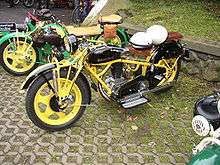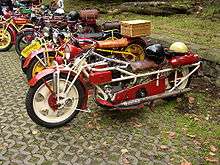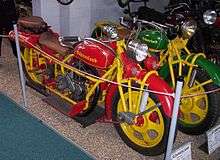Böhmerland (motorcycle)
Böhmerland, or Čechie as it was known domestically, was a Czechoslovak motorcycle manufacturer from 1924 until World War II. Almost all aspects of this distinctive motorcycle were designed by Albin Leibisch, including the extremely long, all-welded tube-frame chassis, the built-up leading-link front forks, and solid cast aluminum wheels, which were an industry first, not widely adopted until the 1970s. The overhead valve single-cylinder engines were typically 600 cc (37 cu in) with a bore and stroke of 78 mm × 120 mm (3.1 in × 4.7 in). The Böhmerland was produced in several wheelbases; a two-seat Sport, a 3-seat Touren, and a 4-seat Langtouren. An experimental machine built for the military seated four soldiers, and used two gearboxes, with the rear operated by a passenger, giving 9 ratios. The Langtouren model is notable for having the longest wheelbase of any production motorcycle, 3.2 metres (10.5 ft). Around 775[1]total machines emerged from Leibisch's factory in Schönlinde and later in Kunratice, Sudetenland, Czechoslovakia. The factory employed 20 workers, assembling parts manufactured locally to Leibisch's specification.[2][3]



| Founded | 1924 |
|---|---|
| Defunct | 1939 |
| Headquarters | Czechoslovakia |
Key people | Albin Liebisch, designer |
| Products | Motorcycles |
Number of employees | 20 |
Literature
- Jan Němec (2010): Legendární motocykl Čechie, Grada, Praha ISBN 978-80-247-3119-3
- Miroslav Gomola (2000): Motocykly Čechie-Böhmerland, AGM CZ, Brno ISBN 80-85991-11-X
- Ivan Margolius (2020): Modernism on Two Wheels, The Automobile, May 2020, UK, s. 52 - 55. ISNN 0955-1328
Notes
- Němec, Jan (2010), Legendární motocykl Čechie, Grada, p. 102
- de Cet, Mirco (2002), The illustrated directory of motorcycles, MotorBooks/MBI Publishing Company, p. 72, ISBN 978-0-7603-1417-3
- Tragatsch, Erwin (1964), The world's motorcycles, 1894-1963: a record of 70 years of motorcycle production, Temple Press, p. 25